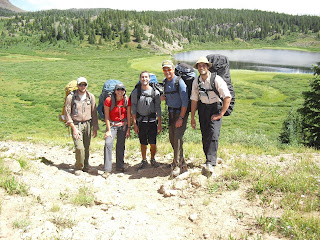For more information please visit: www.lnt.org
All of the principles to follow are designed to equip all of us to be responsible outdoors men and women. We've all had at least one outdoor experience that could have been improved if the person before us had picked up their trash (I've found whole loaves of bread and entire onions left on stumps) or the ones at the campsite next door would quiet down. So, without further adieu, I give you:
Principle 1: Plan Ahead and Prepare
I don't think I could argue that any one principle is more important that another but if you don't plan ahead, you could find yourself in a position to reduce the quality of an area, just because you didn't think to ask the questions.A few specific suggestions:
* Know the regulations and special concerns for the area you'll visit
- On a raft trip, you can pee in the water. In the woods, you should use the soil rather than a stream. Many rules cannot be considered blanket rules. There are just too many variables. Call ahead and find out the rules for the area you'll be in. Not only will you be taking better care of our wild lands but you might save yourself a ticket too.
* Prepare for extreme weather, hazards and emergencies
- As my mother said, "It's better to have it and not need it, than to need it and not have it." An example here might be the forethought to pack your trowel (or lady supplies) for a day hike so you don't just poop...or worse... randomly in the woods (EW. seriously, people- don't do this. Bury it). Also, having good gear really can reduce our impact on the environment. Think camp stove vs camp fire- a huge difference in impact.
* Schedule your trip to avoid times of high use
-Give areas a chance to recover from high use seasons rather than contributing to beating them into oblivion. It'll be better anyway when you don't see anyone for days.
* Visit in small groups. Split larger parties into groups of 4-6
- Some places, like the Boundary Waters, require this. Others don't but it's still a good practice. Again, this avoids too much use on an area at one time. It's also (in my opinion) a better way to get to know you hiking companions when the group is small. You can plan to meet up for meals or breaks as you backpack but walk in smaller groups. You will also give yourself a better shot at seeing wildlife without so much chatting (right, chicks?). ha. Here's a pic of our small hiking group in the Flat Tops.
* Repackage food to minimize waste
- Ditch the cardboard and bulk bags. Carefully measure out how much food you need for your trip and repackage it into 1-2 lb portions. It's easier to divide weight this way. Repackaging means less weight to carry and less mess (we've all seen wet cardboard...it's tempting to ditch it...get rid of it in advance instead)
* Use a map and compass to eliminate the use of rock cairns, flagging, or marking paint
- Again, this is called Leave NO Trace. Even marking your path with sticks is altering an area and it's better to leave what you find, the way you find it. More on that later.


No comments:
Post a Comment